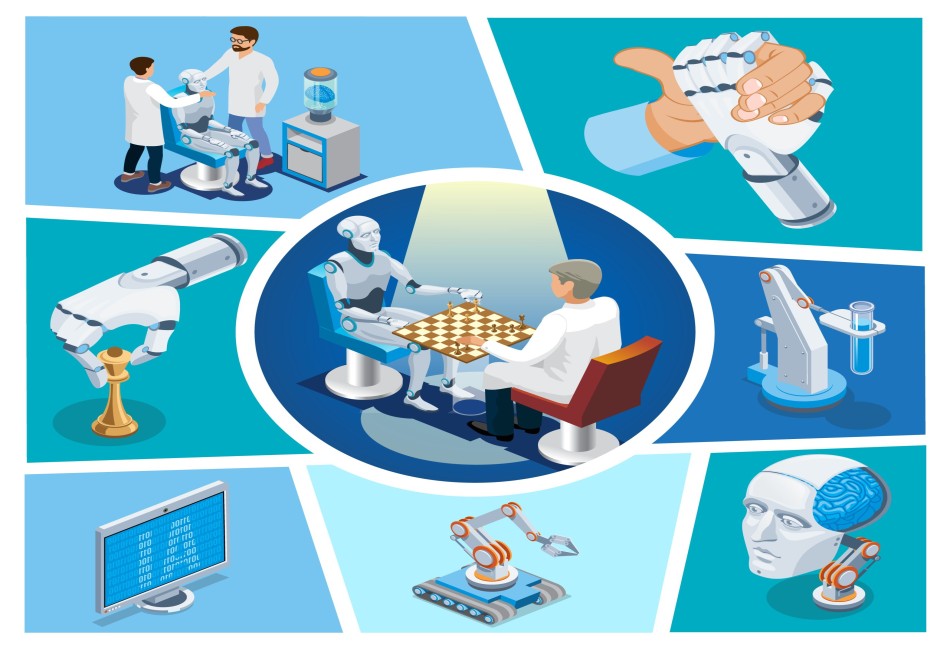As the medical services scene develops at an uncommon speed, the combination of mechanical headways is becoming basic for upgrading patient consideration. Among these advancements, man-made intelligence (Computerized reasoning) and ML (AI) improvement administrations are at the front, reshaping how medical care is conveyed. These innovations address the fate of medical care as well as are effectively being integrated into different parts of the business, opening open doors for better tolerant results, smoothed out clinical work processes, and streamlined functional efficiencies.
As indicated by a report by Fortune Business Bits of knowledge, the worldwide medical care man-made intelligence market is projected to arrive at USD 208.2 billion by 2028, developing at a CAGR of 37.6% from 2021 to 2028. This surprising development features the rising significance of artificial intelligence and ML in changing medical services frameworks around the world.
What is artificial intelligence and ML Advancement Administrations in Medical services
Computer based intelligence in medical care is the usage of AI (ML) calculations and other mental advancements in clinical settings. Artificial intelligence includes PCs and machines imitating human discernment, including picking up, thinking, and independent direction. In medical care, this implies utilizing computer based intelligence to examine and follow up on clinical information, frequently to foresee explicit results.
One remarkable use of computer based intelligence in medical services is involving ML and mental advances for clinical analyses. By breaking down quiet information and other important data, man-made intelligence can help specialists and clinical suppliers in making more precise analyses and making powerful treatment plans. Furthermore, simulated intelligence empowers a more prescient and proactive way to deal with medical services by breaking down enormous datasets to foster better preventive consideration proposals for patients. Thusly, these days the majority of the medical services suppliers are employing artificial intelligence and ML improvement organization to make state of the art mechanized programming for better understanding consideration.
Significance of artificial intelligence and ML in Medical services
Artificial intelligence and ML are reforming the medical services area by offering various benefits that improve patient consideration and functional effectiveness:
Upgraded Determination and Treatment: man-made intelligence and ML work on analytic precision by investigating huge datasets to distinguish designs that might evade human examination. A concentrate by JAMA Inside Medication found that man-made intelligence calculations can determine skin disease to have a 91% precision, outperforming human dermatologists at 87%.
Prescient Investigation: man-made intelligence engages medical services suppliers to expect sickness episodes and patient results. For instance, ML models have been utilized to anticipate the spread of Coronavirus, helping with ideal intercessions.
Functional Productivity: Via computerizing regulatory errands, simulated intelligence decreases the weight on medical care staff and limits blunders. Research demonstrates the way that artificial intelligence can lessen managerial costs by up to 30%, empowering medical services associations to actually apportion assets more.
Customized Medication: artificial intelligence works with accuracy medication by investigating individual hereditary and ecological variables. This prompts more successful treatments custom fitted to the exceptional necessities of every patient.
Cost Decrease: Through improvement of analytic and treatment processes, man-made intelligence can bring down medical services costs while keeping up with elevated requirements of care. A report by McKinsey gauges that simulated intelligence might actually save the U.S. medical services framework up to $150 billion every year.
Worked on Understanding Commitment: artificial intelligence driven apparatuses, for example, chatbots and virtual wellbeing associates, improve patient commitment by giving convenient data and updates. An investigation discovered that computer based intelligence driven wellbeing collaborators further developed prescription adherence by half.
Uses of simulated intelligence and ML Improvement Administrations in Medical services
Man-made brainpower (artificial intelligence) and AI (ML) have changed the medical care area and it is helpfully influencing specialists, emergency clinics, insurance agency, and related enterprises. These progressions have frequently brought about additional positive and significant effects contrasted with different fields.
The following are the significant utilizations of Man-made consciousness (computer based intelligence) and AI (ML) in the medical care space.
Overseeing Clinical Records and Different Information
The underlying move toward medical services includes aggregating and dissecting data like clinical records and patient history. Information the executives is the most pervasive utilization of man-made reasoning and advanced mechanization. Robots handle the assortment, stockpiling, reformatting, and following of information which gives quicker and more steady access.
Performing Tedious Undertakings
Assignments like investigating tests, X-beams, CT sweeps, and information section can be finished all the more rapidly and precisely by robots. In cardiology and radiology, the sheer volume of information can overpower. Subsequently, in future, cardiologists and radiologists can zero in on the most mind boggling situations where human oversight is pivotal.
Treatment Plan
Artificial intelligence frameworks are created to investigate different information sources — patient document notes, outside research, and clinical aptitude — to assist with deciding the customized treatment plan.
Computerized Conferences
Numerous man-made intelligence based applications are giving clinical conferences in view of individual clinical history and general clinical information. Clients input their side effects, and the application utilizes discourse acknowledgment to look at them against a data set of sicknesses which suggests activities in light of the client’s clinical history.
Virtual Medical attendants
These days medical services space is concocting virtual medical attendants like Molly by Sense.ly a computerized nurture that screens patient circumstances and circles back to therapies between specialist visits. Such projects use AI to help patients, especially those with ongoing sicknesses. Such conversational applications give essential wellbeing data and exhortation to patients and answer their inquiries concerning meds and whether side effects require a specialist visit.
Drug The executives
The Public Organizations of Wellbeing fostered the AiCure application to screen medicine adherence. A cell phone’s webcam works with simulated intelligence to guarantee patients are taking their solutions which assists them with dealing with their circumstances. It is especially helpful for those with serious ailments, patients who frequently ignore clinical guidance, and members in clinical preliminaries.
Drug Advancement
Growing new medications through clinical preliminaries can assume control north of 10 years and cost billions. Man-made intelligence can accelerate this interaction. For example, during the Ebola infection alarm, a simulated intelligence program examined existing drugs to find possible medicines, distinguishing two meds that could lessen Ebola infectivity in only one day — a cycle that typically requires months or years.
Accuracy Medication
Hereditary qualities and genomics research centers around finding changes and sickness joins inside DNA. Man-made intelligence upholds the early recognition of malignant growth and vascular illnesses through body filters and predicts potential medical problems in view of hereditary data.
Wellbeing Checking
Wearable wellbeing trackers from organizations like Fitbit, Apple, and Garmin screen pulses and action levels. These gadgets can provoke clients to practice more and offer information with specialists (and simulated intelligence frameworks) for a superior comprehension of patient necessities and propensities.
Medical care Framework Examination
Artificial intelligence can create medical services advanced solicitations to dissect information for blunders in therapies, and work process failures, and to forestall pointless hospitalizations.
How artificial intelligence and ML Advancement Administrations Reshaping Medical services Industry for Future
Computer based intelligence and ML improvement administrations are updating medical services industry for more productive, exact, and customized care.
Here are key manners by which computer based intelligence and ML improvement administrations is being helpful for the fate of medical services:
Computer based intelligence/ML Upgrades Biopharma Income
The biopharma business is utilizing computer based intelligence/ML across different areas, including drug disclosure, clinical turn of events, assembling, and doctor patient cooperations. AL and ML can decrease drug advancement courses of events, lower Research and development costs, and further develop patient achievement rates.
Consolidating computer based intelligence/ML in Research and development and assembling will empower organizations to scale upgrades and recognize new mechanization valuable open doors.
Improved Conveyance of Care
Man-made intelligence/ML can drive massive changes and efficiencies in medical care administrations. Prescient capacities of these apparatuses help medical care suppliers identify and analyze infections quicker which gives them additional time with patients and possibly works on quiet fulfillment and wellbeing results.
Benefits for suppliers incorporate superior patient access, exact diagnostics, effective cases handling, and better production network the executives. For patients, man-made intelligence can uphold treatment the executives, finding the best protection stations, finding reasonable drug stores, and improving telehealth and illness discovery administrations.
Investigators foresee artificial intelligence will smooth out care conveyance, coordination, and repayment, helping organizations zeroed in on diagnostics, patient consideration, and electronic wellbeing records.
Utilizing Information for Cutting edge Diagnostics
Artificial intelligence/ML apparatuses are significant in dissecting minute organic parts and diagnosing illnesses which brings about better consideration and new business amazing open doors. The reception of cutting edge sequencing and electronic wellbeing records has worked with cutting edge diagnostics by coordinating genomic information with wellbeing records and clinical imaging.
Man-made intelligence/ML will be progressively significant for organizations planning to use complex datasets to acquire upper hands, foster new items, and advance customized medication and patient consideration.
Investigators view diagnostics as a superb region for computer based intelligence/ML venture. Organizations zeroing in on less obtrusive techniques might see diminished request as artificial intelligence recognizes and treats sicknesses prior.
Brilliant gadgets and observing innovation additionally present venture amazing open doors. Computer based intelligence can investigate patient information from gadgets, identify anomalies, suggest medicines, and screen wellbeing constantly. Later on, savvy inserts could empower suppliers to remotely follow patient recuperation.



